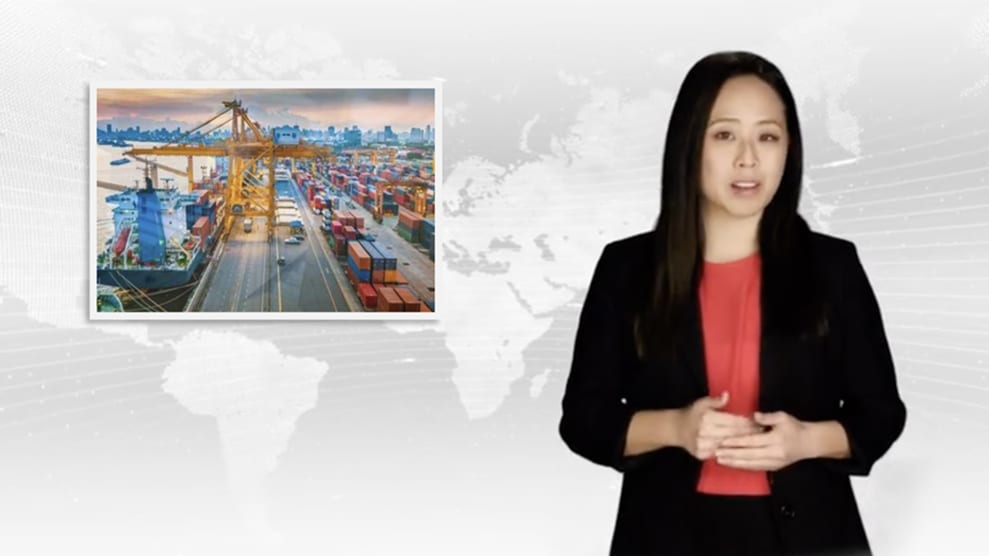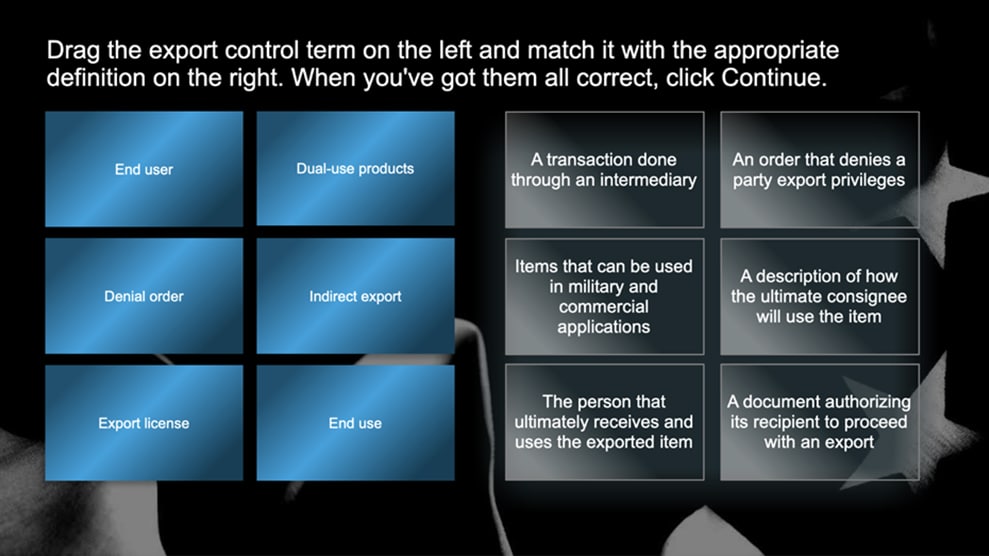
Export Controls
Help prevent costly export law violations that can result in civil and criminal penalties, including fines up to $1 million per violation.
Course description
Traliant’s Export Controls training is a 30-minute interactive course provides a clear overview of the regulations governing the shipment, transfer and dissemination of goods, services and technology. The course will help employees understand how to identify situations where these controls apply and respond effectively to ensure compliance.
ONLINE TRAINING
Export Controls

The course covers these topics and more:
- What is an export?
- Export control terms and concepts
- ITAR – International Traffic in Arms Regulations
- EAR – Export Administration Regulations
- OFAC – Office of Foreign Assets Control
- Compliance
- Red flags
- Compliance with the law and consequences of non-compliance
THE TRALIANT DIFFERENCE
Compliance you trust.
Training and solutions you love.

Legal expertise
Our in-house legal team is at the heart of our course development, writing content and ensuring compliance. As laws change, they provide real-time updates so you can trust your training is accurate and up to date.

Brilliant training
Each year we release brand-new, cinematic, Netflix-style courses with fresh stories, interactive scenarios, and industry-specific nuance. The result? A lasting impact on your culture and an experience employees will love.

Innovative solutions
With TikTok-style micro reels, advanced AI translations, phishing simulations, policy and handbook services, and analytics in one scalable platform, we make compliance simple and engaging now and into the future.

Valued partnership
Our main focus? It’s all about making your job easier. We do that with unmatched responsiveness and seamless deployment, dedicated to driving your success.
KEY FEATURES
Why you'll love our training
It’s time to embrace a new era of online training with a valued partner who will ensure seamless implementation, a truly enjoyable learning experience, and courses with continuous compliance you can trust.
Compliance expertise
Traliant's in-house legal expertise ensures training is accurate and kept up-to-date with any regulatory changes.
Accessible to users with disabilities
Traliant provides an inclusive experience for all users, including those with disabilities, by going beyond Section 508-C standards and offering WCAG 2.1/2.2 AA.
Story-based learning
Our story-based approach blends leading instructional design with Hollywood talent to produce engaging, interactive and nuanced training.
Course administration
Traliant makes it simple to roll out training to your workplace and provide technical support directly to your employees at no additional cost.
Course customizations
Tailor courses to include your logo, relevant policies, workplace images, and more. Traliant can even customize the course with scenarios that take place in your own workplace environment.
Translations
Training is available in English, Spanish and is supported in over 100 languages.
COMPLIANCE EXPERTISE
Your partner in training compliance

Uniquely qualified in-house compliance team
Our exceptional in-house Compliance Advisory Team is led by Michael Johnson, Chief Strategy Officer and former U.S. Department of Justice attorney who has provided training and guidance to organizations like the Equal Employment Opportunity Commission, Google, the United Nations, and the World Bank.

Keeping you compliant, effortlessly
Keeping up with the complex web of employment laws — especially if your workforce spans multiple states — can be tricky. That’s why we offer a streamlined training solution that ensures you stay compliant with federal, state, and local regulations, so you can focus on what matters most: your team.

Simplifying your policies and handbooks
Crafting an employee handbook that meets legal standards can be daunting. Let us ease the burden. We help you navigate regulatory changes to ensure your policies and handbooks not only comply with the law but also reflect industry best practices.
What to consider when choosing the most effective export controls training

- Prevent costly legal violations: Export control violations can result in significant fines and penalties, including jail time for individuals. Training helps organizations to comply with export control laws and to protect themselves from these risks.
- Ensure compliance: Training helps to ensure that employees are aware of the company's export control policies and procedures and that they are following them.
- Maintain a strong ethical culture: Training helps to promote a culture where employees understand the importance of compliance and are committed to following export control regulations.
- Empower employees: Training provides employees with the knowledge they need to understand export control regulations and to make informed decisions about how to handle transactions and information.
- Strengthen your organization's compliance program: A robust export controls training program is an essential component of a strong compliance program, helping to mitigate legal and reputational risks.
- Promote a culture of responsible exporting: Training helps to create a culture where employees understand that compliance with export controls is essential.
- The International Traffic in Arms Regulations (ITAR): This law regulates the export and import of defense articles and defense services.
- The Export Administration Regulations (EAR): This law governs the export, re-export, and in-country transfers of dual-use items, which are items that can be used for both commercial and military purposes.
- The Office of Foreign Assets Control (OFAC) Sanctions: OFAC administers and enforces economic and trade sanctions based on U.S. foreign policy and national security goals.
- Direct shipments: Sending goods or software directly to a foreign destination.
- Transfers: Transferring software, technology, or information to a foreign national, even if it happens within the U.S.
- Re-exports: The transfer of goods, software, technology, or information that originated in the U.S. to a foreign destination.
- The destination is a country that is subject to sanctions.
- The goods, software, or technology have a military or strategic use.
- The end user is a company or individual that is known to be involved in activities that are prohibited by export control laws.
- The transaction involves a significant amount of money or a large quantity of goods.
- Criminal penalties: Individuals can face jail time and fines.
- Civil penalties: Companies can face significant fines, and individuals can face civil penalties.
- Loss of export privileges: Companies can lose their ability to export goods or technology.









